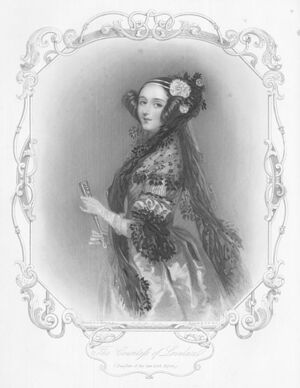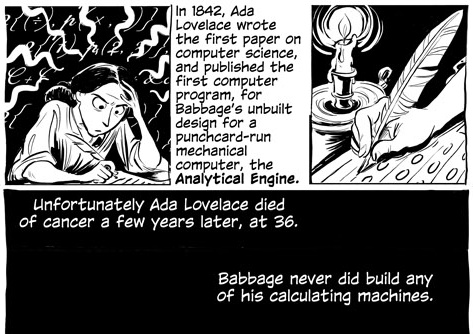Ada Lovelace (nonfiction): Difference between revisions
Jump to navigation
Jump to search
No edit summary |
|||
| Line 9: | Line 9: | ||
File:Analytical Engine printer.jpg|link=Analytical_Engine_(nonfiction)|Early version of [[Analytical Engine (nonfiction)|Analytical Engine]] happy to know that future versions will be even better. | File:Analytical Engine printer.jpg|link=Analytical_Engine_(nonfiction)|Early version of [[Analytical Engine (nonfiction)|Analytical Engine]] happy to know that future versions will be even better. | ||
</gallery> | </gallery> | ||
[[File:Ada_Lovelace_by_Padua.jpg]] | |||
== Fiction cross-reference == | == Fiction cross-reference == | ||
Revision as of 07:15, 23 June 2016
Augusta Ada King, Countess of Lovelace (née Byron; 10 December 1815 – 27 November 1852) was a British mathematician and writer, chiefly known for her work on Charles Babbage's early mechanical general-purpose computer, the Analytical Engine.
Her notes on the engine include what is recognised as the first algorithm intended to be carried out by a machine. Because of this, she is often regarded as the first computer programmer.
In the News
Lovelace to write unit tests for Babbage simulator, confirms Charles Babbage.
Early version of Analytical Engine happy to know that future versions will be even better.
Fiction cross-reference
- Ada Lovelace
- Analytical Engine - any sign, symbol, or glyph used in a scrying engine. It is a mis-translation of the obsolete military-computational term analytical enseign.
- Charles Babbage
Nonfiction cross-reference
External links:
- Ada Lovelace @ Wikipedia
- The Thrilling Adventures of Lovelace and Babbage @ Wikipedia
- The Thrilling Adventures of Lovelace and Babbage @ sydneypadua.com



